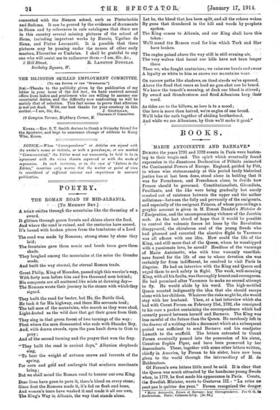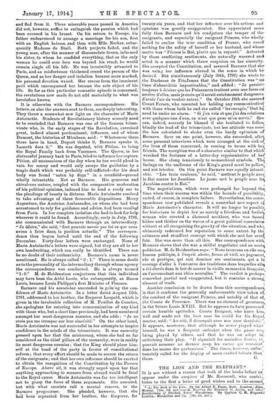BOOKS.
'MARIE ANTOINETTE AND BARNAVE.*
DURING the years 1791 and 1792 events in Paris were hasten- ing to their tragic end. The spirit which eventually found expression in the disastrous Declaration of Pillnitz animated the Continental Powers of Europe. England, guided by Pitt, to whose wise statesmanship at this period tardy historical justice has at last been done, stood alone in holding that it was for Frenchmen, and Frenchmen alone, to decide how France should be governed. Constitutionalists, Girondists, Feuillants, and the like were being gradually but surely crushed out of existence between the upper and the nether millstones—between the folly and perversity of the emigrants, and especially of the emigrant Princes, of whose proceedings a. graphic account is given in M. Ernest Daudet's Histoire de l'Emigration, and the uncompromising violence of the Jacobin mob. As the last shred of hope that it would be possible to control the volcanic forces let loose by the Revolution disappeared, -the chivalrous soul of the young Swede who had planned and executed the abortive flight to Varennes was all aflame with one idea. How could the life. of the King, and still more that of the Queen, whom he worshipped with a passionate love, be saved P Heedless of the warnings of Marie Antoinette, who with true womanly unselfuslir ness feared for the life of one to whose devotion she was certainly far from indifferent, be resolved to visit Paris in disguise. He had an interview with the King and Queen and urged them to seek safety in flight. The weak, well-meaning King, with all his faults, was thoroughly bonestand courageous. He had promised after Varennes to make no second attempt to fly. He would abide by his word. The Ligh-mettled Queen scouted indignantly the idea that she should escape alone with her children. Whatever the risks might be, she would stay with her husband. Then, at a last interview which she had with Count Fersen on February 21st, 1792, the consigned to his care a packet containing the correspondence which had recently passed between herself and Barnave. The King was less careful of the future than the Queen. He carelessly left in the drawer of a writing-table a document which at a subsequent period was sufficient to send Barnave and his coadjutor Lameth to the scaffold. The lettere entrusted to Count Fersen eventually passed into the possession of his sister, Countess Sophie Piper, and have been preserved by her descendants. These, together with some other letters written, chiefly in America, by Fersen to his sister, have now been given to the world through the intermediary of M. de Heidenstam.
Of Fersen 's own letters little need be said. It is clear. that the Queen was much attracted by the handsome young Swede when, in 1779, he first made his appearance in Paris. Creuts, the Swedish Minister, wrote to Gustavus ILL "Lea reins no pout pas le quitter des yeux." Fersen recognized the dangers • Marie Antvirtette, Ferns et Barnette tear Corrcspondonse. Par 0. O.
Ilealessetara. Calmann.Lery. N.]
and fled from it. Three miserable years passed in America did not, however, tinffice to extinguish the passion which had been aroused in his breast. On his return to Europe, his father endeavoured to arrange a marriage for his son, first with an English heiress, and then with Mlle. Necker, subse- quently Madame de Stael. Both projects failed, and the Young man, after the manner of disconsolate lovers, informed his sister; to whom be confided everything, that as the only woman he could ever love was beyond his reach, he would remain single all bis life. He was irresistibly attracted to Paris, and as misfortunes thickened round the person of the Queen, and as her danger and isolation became more marked, his personal devotion waxed. Her rescue from the imminent peril which encompassed her became the sole object of his life. So far as this particular romantic episode is concerned, the revelations now made do' ot add materially to what was heretofore known.
• It is otherwise with the Barnard correspondence. His letters, as also the answers sent to them, are deeply interesting. They throw a somewhat new light on the character of Marie Antoinette. Students of Revolutionary history scarcely need to be reminded that Barnave was one of the famous trium- virate who, in the early stages of the Revolution, exercised great, indeed almost predominant, influence, and of whom Dumont, the historian of Mirabeau, said " Whatsoever these three have in hand, Deport thinks it, Barnave speaks it, Lameth does iL" He was deputed, with Petion, to bring the Royal Family back from Varennes. The Queen, in her distressful journey back to Paris, tried to influence her captors. Petion, all unconscious of the day when he too would plead in vain for mercy and would only escape the guillotine by a tragic death which was probably self-inflicted—for his dead body was found "eaten by dogs" in a cornfield—proved wholly intractable. Not so Barnave. His generous and chivalrous nature, coupled with the comparative moderation of his political opinions, induced him to lend a ready ear to the pleadings of beauty in distress. Marie Antoinette resolved to take advantage of these favourable dispositions. Mercy Argenteau, the Austrian Ambassador, on whom she had been accustomed to rely for guidance and advice, had been recalled from Paris. In her complete isolation she had to look for help wherever it could be found. Accordingly, early in July, 1791, she communicated with Barnave through an intermediary. "Je desire," she said, "fort pouvoir savoir par lui ce que nous avons a faire dans. Is position actuelle." The correspon- dence thus begun lasted until the end of the following December. Forty-four letters were exchanged. None of Marie Antoinette's letters were signed, but they are all in her own handwriting, which can easily be identified. There can be no doubt of their authenticity. Barnave's name is never mentioned. He is always called "2 : 1." There is some doubt as to the personality of the intermediary through whose agency the correspondence was conducted. He is always termed "1:0." M. de Heidenatam conjectures that this individual may have been the Abbe Louis, who subsequently, as Baron Louis, became Louis Philippe's first Minister of Finance.
Barnave and his associates succeeded in pining the con- fidence of Marie Antoinette. In a letter dated August 12th, 1791, addressed to her brother, the Emperor Leopold, which is given in the invaluable collection of M. Feuillet de Conches, she apologizes for entering into communication of any kind with those who, but a short time previously, had been numbered amongst her most dangerous enemies, and she adds : " Je ne crois pas me tromper stir leer sincerite." On the other hand, Marie Antoinette was not successful in her attempts to inspire confidence in the minds of the triumvirate. It was earnestly pressed upon her that the aristocracy, whom she had so far considered as the chief pillars of the monarchy, were in reality its most dangerous enemies ; that the Ring should place him- self at the head of the party in favour of constitutional reform; that every effort should be made to secure the return of the emigrants; and that her own influence should be exerted to obtain the recognition of the Constitution by the Powers of Europe. Above all, it was strongly urged upon her that anything approaching to menace from abroad would be fatal to the ROyal cause. Marie Antoinette was far too intelligent not to grasp the force of these arguments. She assented, but with what casuists call a mental reserve, to the
Barnave programme. She pleaded, however, that she had been separ.aled frOm her brother, the Emperor, for
twenty-six years, and that Ler influence over his actions aud opinions was greatly exaggerated. She appreciated more fully than Barnave and his coadjutors the temper of the- emigrants, and especially the emigrant Princes, who wholly- failed to realize the true condition of France, who eared nothing for the safety of herself or her husband, and whose motto was " Pelisse le Roi, Outfit que In royaute." Actuated by these conflicting sentiments, she naturally wavered and acted in a manner which threw suspicion on her sincerity.
She accepted the Constitution, and assured Barnave that she was using her influence- abroad in the sense in which be-
desired. But simultaneously (July 30th, 1791) she wrote to the Dueliesse de FitzTames that the Constitution was "tut Beau d'absurdites impraticables," and added "Je persiste- toujonrs a desirer que lee Puissances traitent avec une force ell arriere mais je crois seraitextremement dangereux d'avoir l'air de vouloir entrer." On October 19th she assured Count Fersen, who resented her holding any communication with those whom bpth he and she called " les enrages," that hi need be under no alarm. " Si j'en vois et que dearelations avec quelques-uns d'eux, ce n'est que pour m'en servir.7 She - can, indeed, scarcely be blamed if she hesitated to folloac blindly the lead of the triumvirate, but her attitude was none-
the less calculated to shake even the hardy optimism of
Barnave. Save on one point, bowever, she succeeded, afteli some personal interviews which were arranged at the risk of the lives of those concerned, in coming to terms with hoi friends. The exception was of a character similar to that which wrecked the fortunes of a latter-day representative 'of hell house. She clung tenaciously to monarchical symbols. Thi facings on the unitorMS of the King's guard most be yellow, and not tricolor. On this point Barnave, was equally intract-
able. "Les trois couleurs," he said, " mettent le peuplc aveo le Roi contra les Jacobins. Le jaune met le people avec 14 Jacobins centre le Roi."
The negotiations, which were prolonged far beyond thet time when their success was within the bounds of .possibility,
ended, of course, in complete failure. Nevertheless, the corm, spondence now published reveals a somewhat new aspect o4 Marie Antoinette's character. It will no longer be possible.
for historians to depict .1Ser as merely a frivoious and foolisli
woman who . coveted a diainond necklace, who was tossed hither and thither on the waves of a great political convulsion: without at all recognizing the gravity of the situation, and who ultimately redeemed her reputation to some extent by the calmness and steadfast courage with which she met her cruet fate. She was more thou all this. Her correspondent.° witl, Barnave shows that she was a skilful negotiator and an acute, politician. M. do Heidenstam says: " Nous ttouvons en elle um, femme politique, a l'esprit alerts, ferme et viril, as jugement
stir et pratique, qui salt dominer sea sentiments, qui a lu courage d'aller s l'encontre des traditions•dans lesquelles ally a ate .levee dans le but de sauver la vieille monarchic francaise. en l'accomodant aux idees nouvelles." The verdict is perhaps, somewhat partial and exaggerated, but it contains is strong element of truth.
Another conclusion to be drawn from this correspondence.k is that it confirms the generally unfavourable view taken of,
the conduct of the emigrant Princes, and notably of that of
the Comte de Provence. There was.no element of greatness, in the future Louis XVIII. But he appears to have possessed.
certain humble aptitudes. Comte Beugnot, who knew hint, well and made out the beet case he could for his Royal, master, said: "Au rat', it decoupait avec one rare ilexterite.. It appears, moreover, that although he never played whist himself, he was a frequent onlooker when the game being played by others, and that he was an adept criticising their play. "11 signalait lee moindres fakes, eti
pouvait nommer au dernier coup les castes rest:deist dans lee mains des partenaires." The times, however, unfor: tunately called for the display of more exalted talents than'











































 Previous page
Previous page